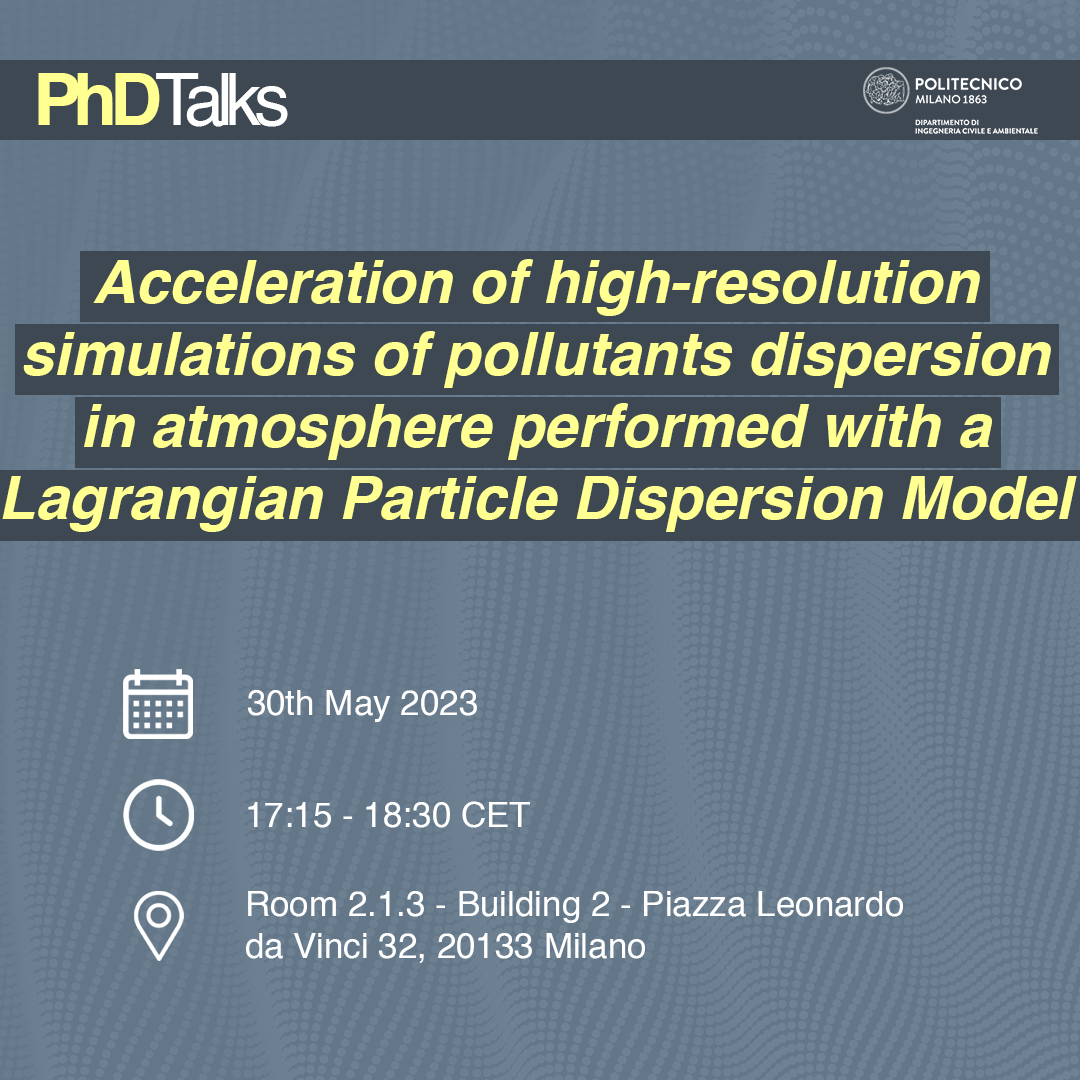
- This event has passed.
PhDTalks | Acceleration of high-resolution simulations of pollutants dispersion in atmosphere performed with a Lagrangian Particle Dispersion Model
30 May 2023 @ 17:15 - 18:30

We are glad to announce that our next PhDTalks Seminar will be held on Tuesday 30th May in Room 2.1.3 (Building 2), from 5:15 pm to 6:30 pm CET.
PhDTalks is a series of seminars and discussions between PhD students. The events are aimed at providing a place to network and get in contact with many of the projects developed in our department.
Speaker Daniela Barbero will talk about “Acceleration of high-resolution simulations of pollutants dispersion in atmosphere performed with a Lagrangian Particle Dispersion Model”.
At the end of each event a small refreshment funded by the department will be available.
You can watch the event online by clicking here.
Abstract:
Atmospheric dispersion modelling is becoming increasingly important for the air quality assessment of urban environments, especially in residential areas, for regulatory purposes and to project pollution control strategies. Estimating urban air quality is challenging, because of the intrinsic characteristics of cities atmospheric structure, such as high density of primary emissions and presence of local dispersion processes, that produce strong concentration gradients. Therefore, very high spatial resolution simulations may often be required to improve the accuracy of estimations. Consequently, the use of microscale atmospheric dispersion models in long-term studies and forecasting systems is growing. However, this modelling can be ambitious because of the amount of time and CPU required for the simulations, especially if the computational domain has a significant extension. This work presents the use of kernel method as alternative to the common box-counting method to compute concentration inside the microscale Lagrangian Particle Dispersion Model PSPRAY. The kernel method allows a reduction of computational particles emitted during the simulation; it enables therefore to optimize the overall computational costs of the simulation, ensuring at the same time results with an accuracy similar to that of box counting method. The method has been tested to compute hourly ground concentration and deposition fields of gaseous and particulate pollutants emitted by point and linear sources, evaluated both inside a domain divided in tiles and inside a nested domains configuration. The implementation inside PSPRAY has made possible to reduce the computational time of a simulation from 70% to 80%. Therefore, it led to an enhancement of the efficiency of model and to a widening of its application field. The PSPRAY model, optimized with the kernel method, has been already extensively applied to evaluate the impact of road emissions in the city of Rome, in the frame of Italian research project BEEP (Big data in Environmental and occupational Epidemiology). This implementation allowed to perform a microscale simulation over the city, considering a 12×12 km2 domain with a horizontal resolution of 4 m and producing hourly ground concentration fields of the pollutants for an entire year, obtaining an average computational time of 3 hours per simulated day on an HPC (High Performance Computing) system with 180 cores.
Speaker’s bio
Daniela is a candidate of an Executive PhD in Environmental Engineering and Infrastructure (35° cycle) at Politecnico di Milano in collaboration with ARIANET s.r.l., of which she has been an employee since 2019, after obtaining a Master of Science in Environmental And Land Planning Engineering at Politecnico di Milano. ARIANET is an Italian consultant company in the field of atmospheric environment and Daniela is involved both in carrying out atmospheric impact studies and in the development of the used models, in particular Lagrangian Particle Dispersion models. In her free time, Daniela enjoys reading books and travelling.
